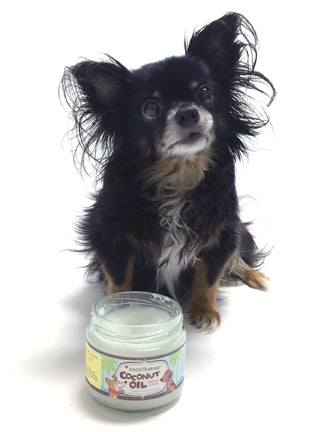If you're a regular reader of this blog, you may know that virgin coconut oil is the richest source of medium-chain triglycerides (MCTs) found in nature.
You may also know that the high levels of MCTs in coconut oil are responsible for many of its amazing health benefits.
But let's back up a bit.
There's a lot of buzz about MCTs these days. You've probably seen them mentioned online or on TV. Maybe you've seen the term printed on food and supplement labels.
But it can sometimes be difficult to find a straightforward explanation of what they are and what they do.
So, what exactly are MCTs? And what benefits can they have on your pet's health?
In this post we'll attempt to cut through the jargon and answer those questions in the simplest way possible.
Ready to learn all about MCTs? Then let's get started.
What Are MCTs?
Medium-chain triglycerides (MCTs) are a type of fat (lipid). All fats and oils are made of triglycerides, and there are many different types.
Triglycerides are made of individual fat molecules called fatty acids, and 3 fatty acids make up a single triglyceride molecule.
Medium-chain triglyceride oils are comprised of 100% medium-chain fatty acids (MCFAs), which are responsible for many health benefits.
To drill down further, coconut oil contains different types of medium-chain fatty acids (MCFAs), each responsible for various health benefits, namely lauric acid, caprylic acid, and capric acid.
Lauric acid is often considered the most beneficial of the MCFAs and gives coconut oil its immune-supporting properties.
Coconut oil contains 64% medium-chain fatty acids (MCFAs). Therapeutic-grade oil such as CocoTherapy coconut oil contains high levels of lauric acid – at least 53% (compared to 40% or less in grocery store brands).
When consumed, the body breaks down MCTs and utilizes medium-chain fatty acids (MCFAs) for its beneficial properties.
The terms MCFAs and MCTs are often used interchangeably. But for the sake of simplicity, all you need to know is that MCFAs make up MCTs which come from coconut oil.
What Are LCTs?
Long-chain triglycerides (LCTs) are the most common types of fats found in nature. They are broken down by the body into long-chain fatty acids (LCFAs).
Most fats in the diets of pets (and humans) are composed of LCTs. These are the types of fats found in foods like meat, fish, eggs, dairy, and most types of oils.

How Are MCTs and LCTs Used by the Body?
Triglycerides are named after the length of their fatty acid chains. They are composed of a glycerol backbone and 3 fatty acids.
Medium-chain triglycerides contain chains of fatty acids with 6-12 carbon atoms. In comparison, long-chain triglycerides contain chains with 13-21 carbon atoms.
Coconut oil is an MCT comprised of MCFAs including caprylic, capric, and lauric acids. To understand why MCTs are beneficial to health, let's take a look at the way MCTs and LCTs are broken down in the body.
MCTs
Unlike LCTs, MCTs are broken down rapidly due to their shorter chain length. When consumed, they go straight to the liver where they can be used as an efficient fuel source or turned into ketones.
Ketones act as an alternative fuel to glucose – a much more potent and efficient fuel that's especially beneficial for brain health. And because your pet's body can immediately use MCTs as a source of energy, they are less likely to be stored as fat.
MCTs actually help stimulate your pet's metabolism and control their weight. They are also easily digested by the body and prevent strain on the gastrointestinal tract.
LCTs
Because of their longer chain length, LCTs are difficult for your pet's body to break down. They require special enzymes to be absorbed by the body and can put a lot of strain on the digestive system and internal organs such as the liver and pancreas.
Because they aren't easily broken down and used by the body, LCTs are often stored as fat. This increases the risk of your pet developing health problems such as obesity and heart disease.
MCTs in Coconut Oil
Because virgin coconut oil is such a rich source of MCTs, it can benefit your pet's health in lots of ways.
The most abundant MCFA found in coconut oil is the "super ingredient" lauric acid. Lauric acid has a wide range of health benefits for pets including the power to boost the immune system, protect the skin and coat, and keep the gastrointestinal tract healthy.
And as we mentioned earlier, the MCTs in coconut oil also help speed up metabolism, aid fat loss, and maintain heart and brain health. For more information on the specific health benefits of coconut oil please visit our website.
Unlike most coconut oils found in stores, CocoTherapy organic virgin coconut oil is a therapeutic-grade oil.
This means that it's a healthy, all-natural product that contains a high percentage of beneficial MCFAs including lauric, capric, and caprylic acids that help maintain and support your pet's health.
CocoTherapy coconut oil contains 53% lauric acid, compared to 40% in grocery or cooking-grade coconut oils.
Please check out our previous post, How to Use Coconut Oil With Your Pets, to find out more about supplementing your pet's diet with CocoTherapy organic virgin coconut oil.



